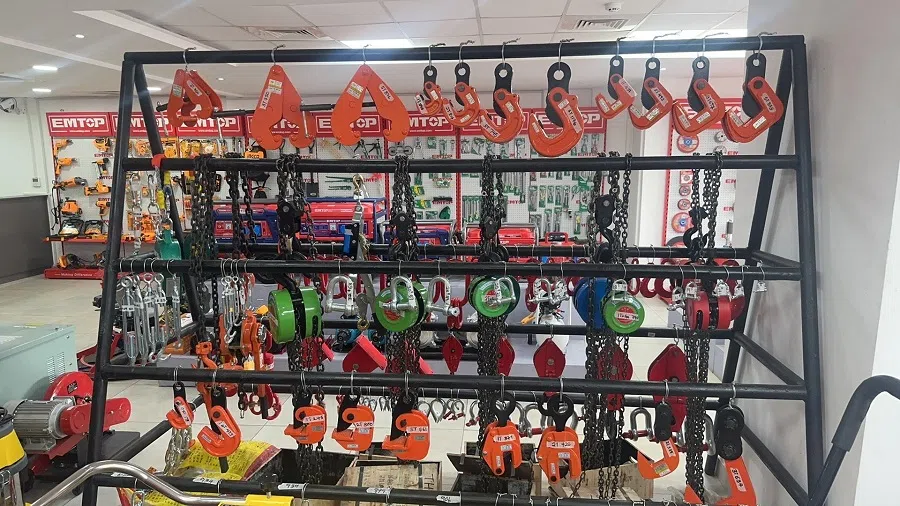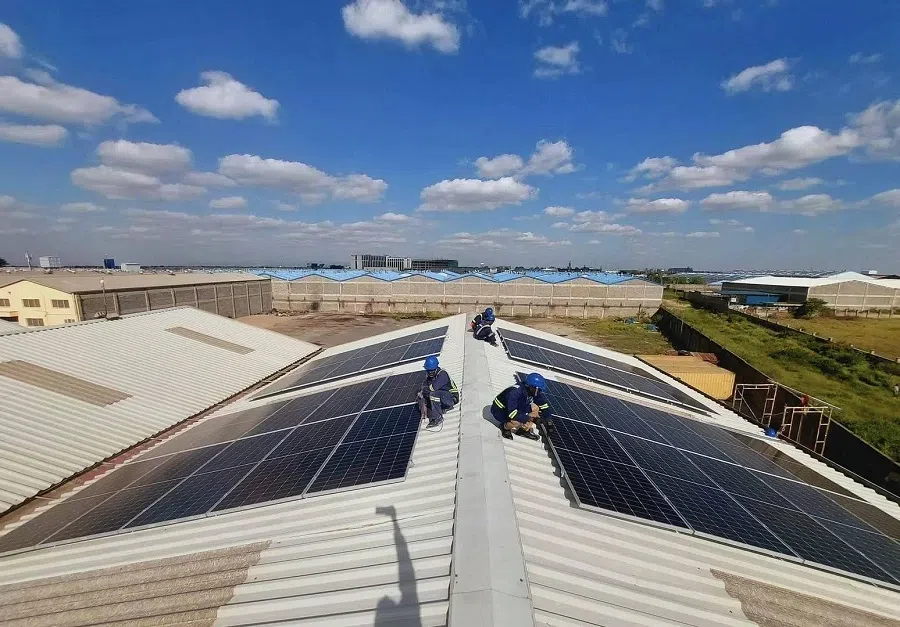[Big read] Chinese youths seek fortune in Africa amid economic slowdown
Lianhe Zaobao correspondent Lim Zhan Ting speaks to young Chinese who have made the journey to Africa to find their own way to success, rather than stay in China and get lost amid involution and intense competition.

In March this year, Chen Changzhan, a 32-year-old from Guangdong, took the first flight of his life to Ghana, a small country in West Africa. Despite his reluctance and apprehension, Chan, who does not speak English, bade farewell to his loved ones and flew there alone. His mission: start a hardware store there.
Why did Chen go all the way to Ghana to start a hardware business? He told Lianhe Zaobao that he ran a construction materials business back home for nearly a decade, initially enjoying a comfortable life. However, the recent economic downturn and real estate slump in China severely impacted his business, causing revenue to drop from 50 million RMB (US$7.01 million) to 20 million RMB last year. This decline drove him to explore new business opportunities in Africa.
Through the contacts he accumulated from his business dealings in Africa over the past decade, Chen chose Ghana as his destination and invested three million RMB to open a hardware store in Accra. He then hired 11 employees to work in his bright and spacious shop which is well stocked with all kinds of building tools and materials. “We are a professional set-up,” he declared proudly.
Even though he is still some way from breaking even, Chen is highly optimistic. He explained, “Our advantage lies in direct sourcing. By working directly with Chinese factories, we can offer faster delivery than African companies who rely on distributors.”
China’s slowing economic growth and structural shifts are squeezing traditional industries, while the overall job market tightens. Deepening political and economic ties between China and Africa, however, offer a lifeline to Chinese entrepreneurs like Chen.

In September, the Forum on China–Africa Cooperation Summit — held every three years — took place in Beijing. During the summit, China announced with much fanfare its intention to provide Africa with 360 billion RMB worth of financial support over the next three years to encourage further cooperation in areas such as politics, economy and healthcare.
These government measures led to a new wave of “Africa fever” in China as topics like “360 billion RMB worth of opportunities await” and “Gold to be found everywhere in Africa” trended on social media.
... the advantage of these business people is that they have tasted success and can be considered “veterans”. With capital, technical expertise and their teams, they are looking to start anew elsewhere. — Zhang Haichao, a leader of business delegations to Africa, Zhong Shang International Business School
Well equipped for another shot at entrepreneurship in Africa
Though there are currently no official figures on the number of Chinese nationals doing business or working in Africa, data from the Griffith Asia Institute show that Chinese investment in Africa grew by 114% year-on-year in 2023.
Chinese business people in Africa interviewed observed that there was a palpable increase in the number of Chinese companies and nationals heading to the continent since last year, including many middle-class business people looking for another shot at entrepreneurship.
When interviewed, Zhang Haichao, who leads business delegations to Africa for Zhong Shang International Business School, said that this group of business people are successful Chinese entrepreneurs, but with the structural transformation in China’s economic drivers, there is no more room for their industries to develop. One example is the labour-intensive conventional manufacturing industry.
Zhang said frankly, “They have reached the end of their money-making cycles and need to seek their fortunes abroad.”
Zhang also feels that the advantage of these business people is that they have tasted success and can be considered “veterans”. With capital, technical expertise and their teams, they are looking to start anew elsewhere.

What opportunities are there for such “second-time entrepreneurs” in Africa? When interviewed, Liu Jisen, executive president of the Institute for African Studies at the Guangdong University of Foreign Studies (GDUFS), pointed that in recent years, a group of middle-class business people have sold their property holdings in China to invest in real estate and build industrial parks in Africa. Since industrial infrastructure in Africa is relatively poor, the development prospects of any processing industry are vast, especially those related to daily life, such as food processing, or food, clothing, housing, and transportation.
“There is money to be made here, so why return home? Actually, the rich people here can also lead luxurious lives.” — Chen Changzhan, a second-time entrepreneur in Ghana
Liu observed that there are two main types of Chinese businesses that are looking to expand in Africa: those that already have a presence there or those who enjoy first-mover advantage and are looking to invest further; second, those that urgently need to relocate due to market saturation, and rising labour and land costs in China.
As a second-time entrepreneur, Chen, who owns a hardware store in Ghana, feels that he has an advantage. “We are here to outcompete the local companies. I have been in this industry for more than ten years, and [local businesses] cannot compare with me, be it in sourcing goods, business management or ideas.”
Even though he has only been there for seven months, Chen is already open to the possibility of settling down in Ghana for good. “There is money to be made here, so why return home? Actually, the rich people here can also lead luxurious lives.” He added that monthly sales for his shop is around 700,000 RMB and that his profit margin is higher than in China.
... many business people in emerging sectors have also joined in the “gold rush” to Africa. With eager anticipation, they hope to become first movers in areas of bilateral cooperation, such as new energy, modern agriculture and healthcare.
Emerging industries rushing into Africa
The bottom line is that Chen remains pessimistic about the Chinese economy’s future. He lamented on the malaise of its real estate sector, which used to be a key contributor to the economy and job market. “How much time do I have left to await an economic recovery? There is no money in my pockets, so what am I supposed to do?”
Besides individual merchants like Chen from conventional industries, many business people in emerging sectors have also joined in the “gold rush” to Africa. With eager anticipation, they hope to become first movers in areas of bilateral cooperation, such as new energy, modern agriculture and healthcare.
When interviewed, a project manager who is responsible for new energy projects in Africa at a private Chinese company said that his company’s main market used to be developed countries in Europe and North America. But as business slowed down there, it had to enter new markets due to excess inventory arising from overcapacity. Presently, many African countries do not have sufficient power-generation capacities and urgently require new energy solutions, which aligns with his company’s strategic direction.
At the moment, photovoltaics is a key area that his company is focusing on. The manager highlighted that while Chinese new energy technologies and prices are competitive in the European and North American markets, they are even more advantageous in Africa, so much so that Chinese companies have monopolised the photovoltaic panel business in numerous African markets.
On the potential of the photovoltaics industry in Africa, he said: “Like food, electricity is a basic need, and in the fundamental energy industry, Chinese companies offer much better value.”
“It is dog eat dog here among Chinese nationals.” — Chen
Competitors from home eyeing a slice of the pie
Even though opportunities are aplenty in Africa, there are also many who are eyeing a slice of the pie. Hardware store owner Chen said there are 15 hardware shops within a five-kilometre radius of his shop and six of them are owned by Chinese nationals. With a bitter laugh, he said, “It is dog eat dog here among Chinese nationals.”
Amid competition from Chinese peers, Chen is careful not to make enemies since he “might need to borrow goods from others someday”. As for the pressure imposed on Ghanaian companies, he said, “It can’t be helped, we want to make a living too. If they can’t beat us, join us.”

In Kenya, the gateway to East Africa, Dylan Yu also feels the intensifying competition keenly. When interviewed, the founder of energy company Yocean Group, who has been working in Africa for the past 18 years, said many new energy companies that have just arrived in Africa were driven out by the involution in China. To him, this is a double-edged sword that brings fiercer competition, and a greater selection of potential partners with more resources.
Academic: Chinese companies forced by circumstances to Africa
Yu feels that other than the economic downturn in China, tense Sino-US relations is another key factor forcing Chinese companies overseas as those in the new energy sector face higher barriers to entry in the US market. Looking globally, he said, “Southeast Asia has also become highly involuted, while wars have broken out in the Middle East and Russia. At the same time, it is difficult to enter the European market, so that leaves only Africa.”
To GDUFS’s Liu, the greatest difference between the previous and current wave of Chinese companies heading overseas is that the current batch has greater impetus for doing so. “They are forced by circumstances both within and without to either head overseas or be eliminated.”
Chinese companies with technical expertise, that have tasted success, and can afford initial investments of US$500,000 (S$650,000) are more likely to succeed if they choose the right sector. — Zhang
So, are there still opportunities left in Africa for “gold-seekers”? Zhong Shang International Business School’s Zhang feels that competition is unavoidable, and sectors with lower risk and barriers to entry are more prone to involution. “For example, trading in Africa, or selling leftover inventory or discontinued goods there, even though they may be slightly inferior in quality.”
But Zhang also pointed out that such thinking may well be irrelevant, especially since some African countries have started developing manufacturing capabilities, or are already inundated with Chinese imports. He gave the example that nearly every country in East Africa has Chinese businesses that are producing slippers. “So it is clearly not viable to import foam slippers made in China to sell.”
Opportunity and risk go hand in hand
Zhang feels that there is still a threshold to overcome to be successful in Africa. According to him, Chinese companies with technical expertise, that have tasted success, and can afford initial investments of US$500,000 (S$650,000) are more likely to succeed if they choose the right sector.
For instance, in the energy industry, a company needs to position itself differently to stand out from the crowd of competitors. Yocean Group’s Yu said that after more than a decade of tilling the Kenyan market, unlike some recent market entrants from China that only have a “seller” mindset, his company now focuses on providing comprehensive solutions, including design, implementation, after-sales service, and technical solutions.

To many of the business people interviewed, “gold is to be found everywhere in Africa” is an oversimplification. Yu feels that while there are still many opportunities on the whole in Africa, the risks are also very real. Other than political, social, and security factors, there are also practical differences between standards and implementation in a market economy. “The risks may not be seen over six to twelve months, but you will encounter these traps in three to five years.”
Attracted by job opportunities and higher salaries
In August, Sichuan native Wan Bin, 22, went all the way to Zambia, a small country in southern Africa, not long after his graduation to work for a private Chinese mining company. When he first arrived, Wan was comforted to find that those working with him were almost all young people from China.
When interviewed, Wan said that his employer went on a recruitment drive at his alma mater a few months ago. Thereafter, it arranged for its new hires to commence work at the same time, so Wan flew together with dozens of others to Zambia. Almost all of them were fresh graduates born in the 2000s.
... the biggest draw for him is still the remuneration. He revealed that he can earn up to 200,000 RMB annually, or in excess of 16,000 RMB on average each month, twice the pay of similar jobs back home.
Wan, who studied civil engineering, said that the dimming prospects of the industry made it challenging to land a job, so he grabbed the chance to work in Africa. “I saw on Douyin that Zambia is considered stable among African countries. At the same time, it is involved in many bilateral projects with China, especially those related to the Belt and Road Initiative.”
Of course, the biggest draw for him is still the remuneration. He revealed that he can earn up to 200,000 RMB annually, or in excess of 16,000 RMB on average each month, twice the pay of similar jobs back home.
Over the last two months, Wan has been leading a simple life in Zambia. His main job is to manage the local miners and he “only needs to go into the mine occasionally for a look, so it is not too tough”. Fortunately for him, his company follows the local labour standards of eight hours of work, so there is no 996 overtime culture and there is “no need to stay until the higher-ups have knocked off like in China”.
Wan’s life in Africa revolves around his workplace and dormitory. Since it operates in a mining area with little infrastructure, Wan’s company makes transport arrangements for its employees. On weekends, transport is chartered to take everyone to the supermarket. For recreation, the dormitory is equipped with facilities such as a gym, badminton courts, and karaoke equipment.
While Wan is generally satisfied with his new life, his biggest grouse is that “the internet connection is too slow and video streams take forever to load”.

As more Chinese companies expand into Africa and the job market back home remains challenging, an increasing number of youths like Wan find it enticing to work in Africa. On social media platforms like Xiaohongshu, a number of Chinese nationals working in Africa enthusiastically share their work experience and document the highs and lows of living abroad.
At the same time, both the government and self-media outlets in China are quick to share successful examples of youths who have made it in Africa, like the girl in her early 20s who saved 500,000 RMB in two years after heading bravely to Africa, or of the Chinese gold-seeker who repaid a four million RMB debt and made a comeback in Africa. As a result, to many Chinese youths, Africa has gone from being an impoverished land to a land of opportunity.
Based on the stories shared by Wan and other youths on Xiaohongshu, Africa is indeed a good place for many Chinese youths to build up their savings, but there are clearly considerable sacrifices to be made as well.
Chinese manufacturers need to fully utilise cheap local labour
To Zhong Shang International Business School’s Zhang, it is promising that youths are working overseas and broadening their horizons. Since they are still not ready to be entrepreneurs, they can gain experience by working for business people who have moved to Africa, and earn decent incomes and find room to grow.
From a business point of view, Zhang feels that Chinese manufacturers should fully utilise the cheap local workforce when they expand overseas. He feels that the current approach of hiring en masse from China may not be sustainable since “sending a Chinese worker to Africa is several dozen times more expensive than training a local employee”.
As to whether Africa is the solution to China’s youth employment dilemma, Zhang noted that there are only so many Chinese jobseekers that Chinese companies in Africa can recruit, so this may not fundamentally ease the pressure.
Based on the stories shared by Wan and other youths on Xiaohongshu, Africa is indeed a good place for many Chinese youths to build up their savings, but there are clearly considerable sacrifices to be made as well.
In May, Chinese media outlets reported on a 26-year-old woman from Guangxi who tragically passed away in Congo from malaria. She had been working in Africa for three years and was on her way to saving a million RMB in a year’s time. After her death, her parents only cared about seeking restitution from her employer. For many Chinese nationals in Africa, the story touched a nerve, and sparked external concern for their living conditions.
For Wan in Zambia, Africa is not his final destination. He shared that he signed a three-year contract with his employer and hopes to be transferred back to China after that. Given that he is 22 years old now, it would be time for him to think about getting married.
What he is uncertain about is how much the job market in China would have improved by then. “I think that even if the employment issue is not so pressing then, it would not have improved significantly… given our huge population, the graduating cohort each year is large, so cumulatively, there would still be many job seekers.”
This article was first published in Lianhe Zaobao as “中国人闯非洲 寻一条淘金路”.





